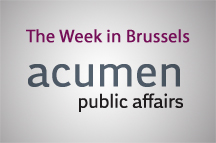High diplomacy
 Helicopters overhead and lines of limousines parked in major streets blocked off to traffic: it has been an extraordinary week in Brussels!
Helicopters overhead and lines of limousines parked in major streets blocked off to traffic: it has been an extraordinary week in Brussels!
Although the EU is undoubtedly a force to be reckoned with on the global economic stage, it is not usually associated with high-level diplomacy. Last week we had the visit of Barack Obama making downtown Brussels a ghost town. This week, however, began with a visit from the leader of the world’s other superpower, China. President Xi Jinping‘s visit was hailed by EU officials as recognition of the importance that China is according to the EU.
Brussels also hosted an EU/Africa week which saw a series of different meetings involving 53 heads of state and government from Africa with business leaders, parliamentarians and youth organisations.
In the meantime, the wheels of international diplomacy continue to turn to define the next steps on the Ukrainian crisis. Suddenly, Brussels is a hive of global “high diplomacy”.
Local “manifs”
At the other end of the spectrum, Brussels is bracing itself for one of the perennial “Manifs” (or demonstrations) protesting against “austerity” on Friday. This is likely to be a large event involving 70-80,000 people who will create further disruptions in the European quarter.
Technical issues in Brussels plenary
Sandwiched between global and local events, the usual diet of seemingly “eye-glazingly” technical EU legislative deliberations continue. These may not attract similar media attention as President Obama’s visit, but the European Parliament was busy clearing its decks this week, with plenary votes on a number of files. I have picked out a few which I think are interesting:
The EP voted to drastically limit the amount that banks can charge for usage of credit and debit cards, supplementing the original Commission proposal by bringing commercial cards into the scope and setting an upper limit on interchange fees of 7 cents per transaction. Is this a boon to consumers or will it mean higher bank charges in the longer term?
 The plenary voted on Thursday to end roaming charges when using mobile phones abroad by December 2015. This will stop mobile phone operators ripping off consumers, trumpeted the Digital Economy Commissioner, Neelie Kroes.
The plenary voted on Thursday to end roaming charges when using mobile phones abroad by December 2015. This will stop mobile phone operators ripping off consumers, trumpeted the Digital Economy Commissioner, Neelie Kroes.
Finally, the EP voted for greater transparency in clinical trial data used to develop new drugs. This has been hailed as a victory for patients.
A common thread of these measures is the voter appeal and, on the industry side, the potentially big costs entailed. It is no coincidence that these are being discussed ahead of the European Parliament elections and the changeover of the European Commissioners.
Elaine Cruikshanks
Partner, acumen Public Affairs














